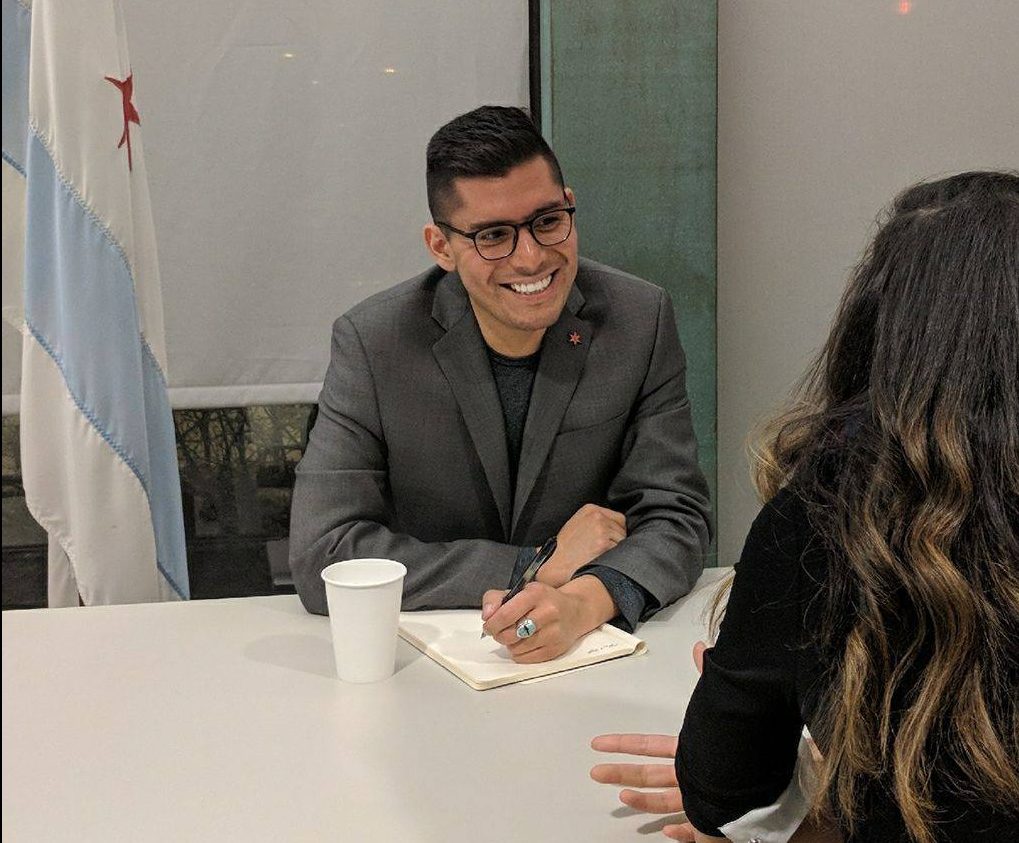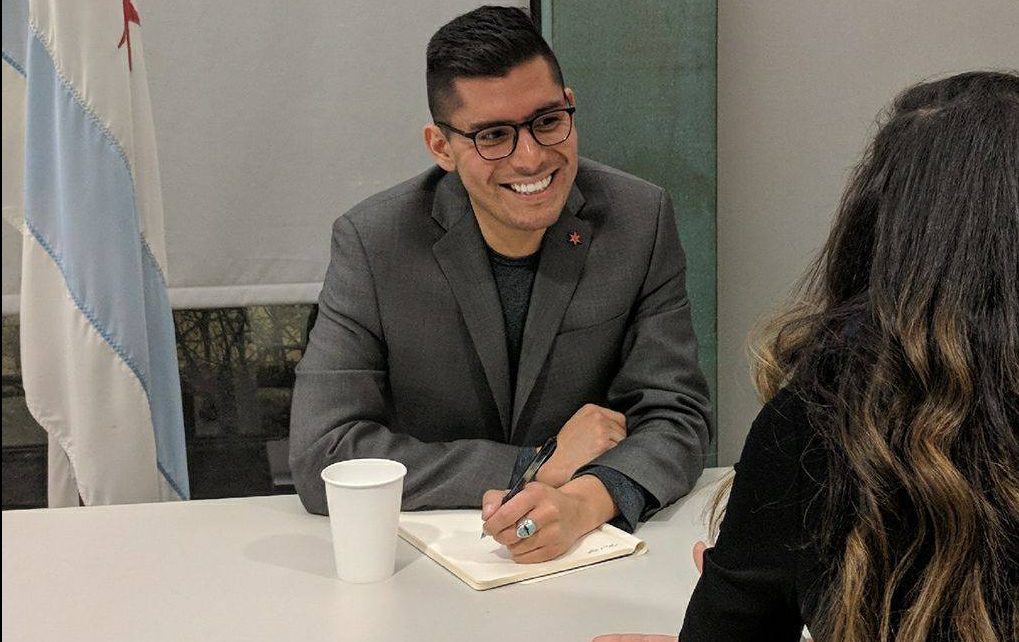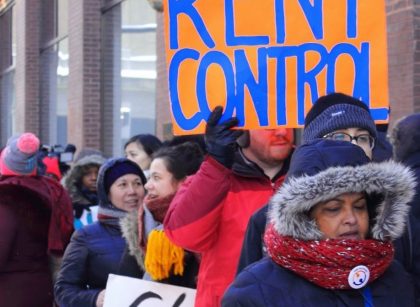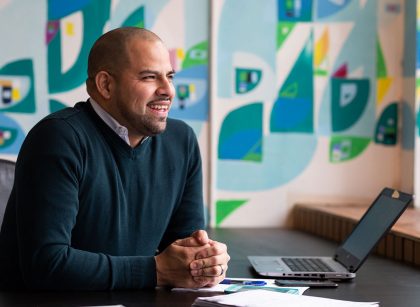
Alderman Carlos Ramirez-Rosa of the 35th Ward in Chicago has emerged as a vocal champion of undocumented workers and their rights during the Covid-19 pandemic. Chicago Mundo Hoy spoke to the always outspoken (and occasionally controversial) alderman on Thursday, April 9, about a variety of subjects including the resilience (thus far) of the Latino community and how the city can help the undocumented population of Chicago amid federal indifference.
Chicago Mundo Hoy: Much has been made of the impact of covid-19 on the African American population in Chicago and elsewhere. How have Latinos and undocumented workers been able to avoid such similarly high numbers so far?
Carlos Ramirez-Rosa: We don’t actually know ‘who’ is undocumented in terms of their status as it relates to whether or not they are affected with covid-19. And rightfully so we don’t keep rack! When you call an ambulance, nobody is asking “Hey, where are your papers!” And that is a good thing.
But we can look at certain populations that come from immigrant backgrounds, second generation, permanent residents, we did see that a majority of deaths are not occurring in the Latino population that it is occurring in the black population. It’s difficult to figure out why that is, so we can only speculate.
One thing to look at is age. Age is a major impact on whether on how hard Covid will hit you, and Latino is generally much younger than population as a whole. Our population by and large is less likely to be severely impacted if they do contract covid-19, whereas Chicago’s African American population tends to be a little bit older.
Monday, on call with the Mayor, we learned a number of covid-19 cases in the African American community are clustered around churches that either continue to have services after stay at home order or that hosted funerals. That led to quite a number of infections and fatalities. Among Latinos in Chicago, while there are many that go to church, those that do are majority Catholic and Catholic services have stopped.
What was the significance of Mayor Lightfoot’s executive order last Tuesday?
The City of Chicago has “welcome to city” ordinance going on a decade which says it is a sanctuary city, and anyone has the ability to request and receive city services without fear of being asked about national origins or being turned over to ICE.
By and large what that ordinance has meant is that regardless of what language is your primary, language you have the ability to walk into a city office dial 3-1-1 and request those city services. The relief efforts the city has been rolling out include the Department of Public Health hotline, including free CPS lunches and mobile testing sites, and a $2 million housing assistance grant. We also have $100 million in small business assistance funds. All of those things are accessible and available to all Chicagoans. One key thing here has been getting out the word to the undocumented community to let them know they qualify. I have worked on that effort with the Latino Caucus and the Dept of Housing to get out the word.
(Editor’s note: grants for housing assistance went live Friday March 27 and applications were due Wed April 1.)
How did the Latino Caucus help shape the housing relief efforts?
Initially, the Dept of Housing’s plan was to do a first come first serve online application. So many things have to happen online because we don’t have the desire to create opportunities for transmission. But we also knew that would create a barrier for undocumented workers who may not have access to a computer or computer literacy. So we said if we do first come first serve that means people who are online, who can google in seconds, are going to be the only ones that can benefit from this fund. That means undocumented workers, older folks, people who have more limited access to the internet, are not going to be able to benefit. So we asked for it to be a lottery.
That gave an opportunity for us to get the word out to the undocumented community and also aldermanic ward offices to help them fill it out online over the phone. We were also able to reach out to ethnic media when that went live: targeted outreach to Univision, Telemundo, and through the Coalition for Refugee Rights, get out translated infographics.
I think it was a successful effort. The application was filled out by 83,000 people!!! For 2000 grants. Around 25 percent of applications were filled out in Spanish.
How is the City of Chicago (and Illinois) stepping up with funding where the federal government did not assist?
The failure of federal government to include all Americans in federal corona-virus relief efforts is a travesty and public policy nightmare that makes everyone and the city of Chicago less safe. Undocumented business owners own landscape shipping manufacturing companies. Restauranteurs. Individuals that work as engineers and consultants. They are feeling the pain of this recession just like everyone else. They employ countless Chicagoans. However, they were excluded from small business relief.
So what this means is that there are hundreds of thousands of Chicagoans who are working on the front lines in hospitals and keep food supply chain up and running that are not eligible for basic relief. That means that we are all less safe.
It shows how interconnected we are as a society.
Many mutual aid networks across the city; for people to sign up and volunteer to be part of mutual aid networks and office of my neighbor Rossana Rodriguez we have partnered with that mutual aid network to bring the support of our ward offices. We realized a lot of mutual aid work was happening online which is a challenge for people with limited English for seniors, for people who do not have literacy skills. We have a printer an access to a ward expense account and a telephone line that is staffed by a city employee. We set up our own mutual aid networks to reach most vulnerable people in our community. We tracked people with lowest median age and lowest income, elderly working poor working class and might not have a computer at home. We created a mutual aid newsletter to have people call ward office to make request.
What type of assistance are people asking for?
The biggest request is around food security. Our food pantries are seeing bigger need than ever before so many Americans receiving SNAP benefit locally it’s the link card, so many you have the link card it’s just not enough. It won’t make it through the month. They supplement food budget with food pantries, we’re seeing a really big demand right now, they don’t have that much to offer, and if you are undocumented, you don’t qualify for benefits so you are turning to a food pantry if you need food. Many seniors cannot or should not leave their homes, and even for stores that have set up senior hours, it can still be very difficult to get there.
People are very worried about paying rent or unemployment mortgage. Our office has helped 300 people apply for housing or unemployment assistance. These are folks that are in crisis and need help but can’t go online. To my knowledge the 33rd 40th 47th ward, 49th ward and 35th have all launched mutual aid networks, other offices are doing it as well, they may be taking a traditional service approach, it is just a handful of ward offices that have adopted that because it requires an outreach skill set and a lot of work not all ward office staff may necessarily have.
How are you working with the Mayor’s office?
What we are working on right now, after sending a letter to the mayor’s office, is what we are calling an ‘Immigrant Resiliency Fund’: we are working with Chicago and the philanthropic sector to raise funds that would go towards undocumented Chicagoans and others excluded from federal coronavirus relief. Let’s say you are a US Citizen but you’re homeless. You won’t get access to that relief because it is difficult for the feds to create the paper trail necessary. So we want a local fund that is targeted towards everyone excluded from federal relief.
We are looking at different funding ordinances that are already in the cue: The Bring Chicago Home Ordinance. We’re asking people selling properties that have a value of millions or more to pay a real estate transfer tax that would generate hundreds of millions of dollars. So there ARE revenue options on the table. We are also asking the private sector to STEP UP. They are sitting on hundreds of millions of dollars. The money they have released thus far is just no where near enough.
Can you elaborate?
Lightfoot thanked Ken Griffin two weeks ago. Griffin donated the equivalent of the average Chicagoan giving $25 out of their paycheck. It sounds good “oh he’s donated millions” if you look at the amount of wealth but he just started a new investment fund trying to capitalize and make money off the crisis. They are already seeing returns. Disaster investing! So he’s sitting on a lot of money. I know myself I have donated more than $25, my partner, my neighbors; he can donate a lot more and he should. If ‘he’ won’t then we have to find ways to tax them.
What is the mayor’s position on this?
The Mayor’s predisposition leads her to want to rely more on charity and philanthropy. Then we must fight for progressive taxation.
Philanthropy provides a little bit but nowhere near enough! We need to identify where the money can come from. Right now, Lightfoot’s approach is putting her hand out and saying, “Hey rich people and public-at-large: we need your help.” I think the argument with the Latino Caucus and other progressives is that it won’t happen anywhere near fast enough.
Communication with the mayor’s office has been okay. There was a little bit of frustration when we sent the mayor a letter asking for this resiliency fund, and then she signs an executive order reiterating existing policy. It was not collaborative: we requested one thing, she did another, we didn’t get asked. Yes, it’s good you are reaffirming this to the public but that’s not what we asked for in this moment. That was a little frustrating.
- Amid Pandemic and Government Inaction, Chicago Tenants’ Rights Organizers Step Up - October 26, 2020
- Latino Caucus Members Push for Police Reform, Evictions Protection - August 26, 2020
- Carlos Ramirez-Rosa Leads the Latino Response to Coronavirus - April 20, 2020



